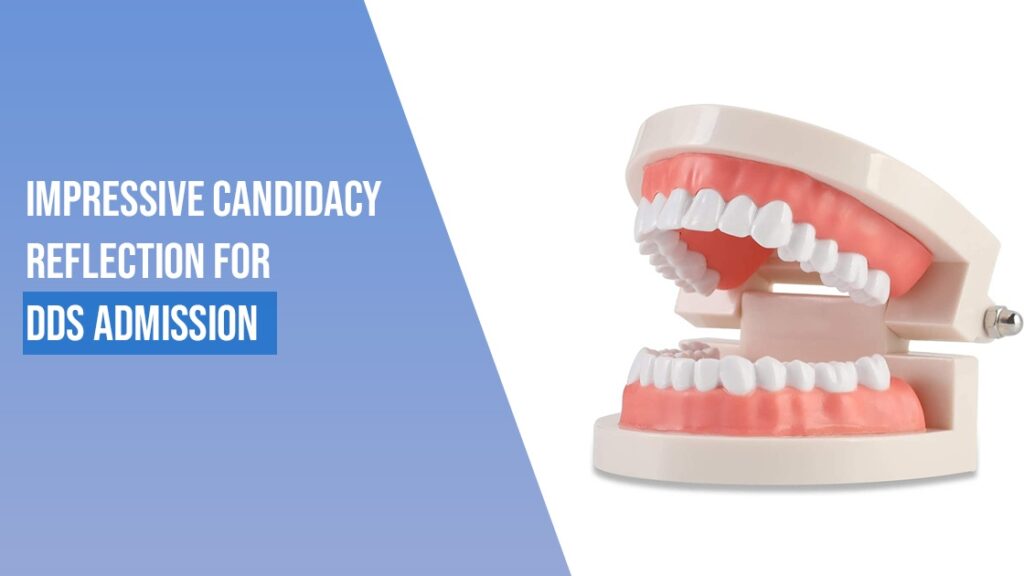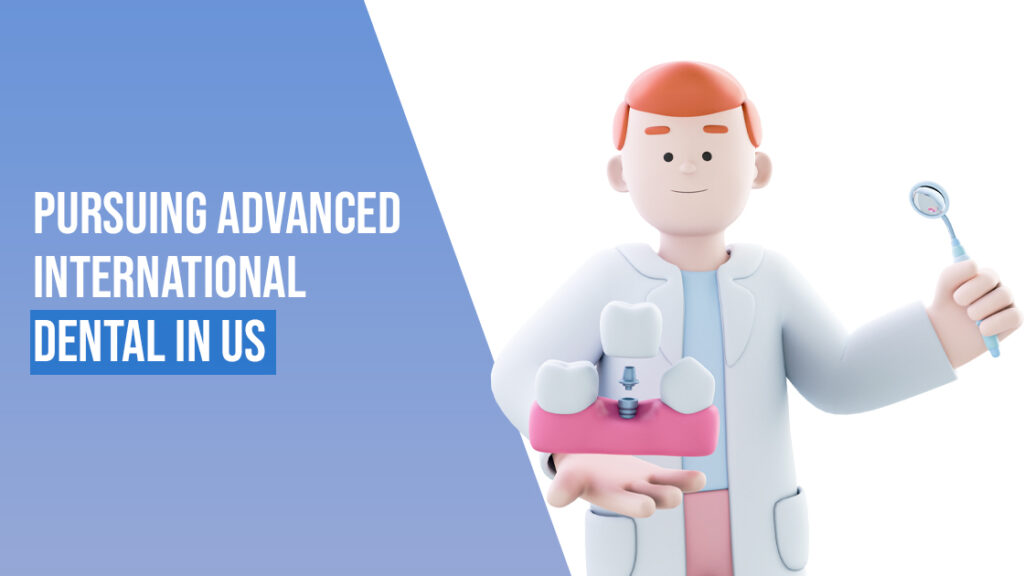Dental schools in the United States have diverse admission criteria. While some schools may emphasize research experience, others may prioritize factors such as GPA, letters of recommendation, and interview performance. Research experience can be beneficial but is only at times a strict necessity for admission to a US dental school. Whether research experience is mandated or highly valued depends on the dental school’s admission criteria.
The Significance of Research in a Dental School Admission Application
Research experience can give you a competitive advantage, especially if you are applying to dental schools that value research. It demonstrates analytical skills, critical thinking, and the ability to work in a team, which are transferable to dentistry. Dental school admissions are highly competitive. Research experience sets you apart from other applicants and can enhance your chances of access to the program. It exhibits your solid scientific background and the ability to engage in academic and scientific pursuits, which can be advantageous in dental education.
For several reasons, research experience plays a vital role in a dental school admission application in the United States.
Ascertains Adaptability and Commitment: Dental care is an ever-evolving field. Research experience can expose you to the latest advancements and innovative techniques in dentistry, making you more adaptable to changes in the industry. Engaging in Research reflects your dedication to dentistry. It shows that you are willing to go beyond the curriculum and actively contribute to advancing dental knowledge.
Critical thinking: Research involves critical thinking and problem-solving. It challenges you to think critically, be persistent, and learn from failures. These skills are highly valued in dentistry, as diagnosing and treating patients requires analytical thinking and making informed decisions. These experiences contribute to personal growth and resilience, qualities that can serve you well throughout your dental career.
Scientific Foundation: Dental practices are rooted in scientific principles, and Research experience provides a strong foundation in scientific methods, which is crucial for understanding the science behind dental procedures and treatments. Your research contributions may lead to advancements in dental science, which can be a source of pride and a testament to your commitment to the field.
Interdisciplinary Learning: Research applies collaboration with experts from diverse specializations. This interdisciplinary exposure can broaden your perspective and help you devise a holistic approach to patient care, which can be valuable for mentorship, guidance, and future career opportunities.
Enhances Communication Skills: Research implicates presenting findings and collaborating with the team. Research experience in a dental school admission application demonstrates your skills and provides a competitive edge in the highly competitive admissions process. It also prepares you for dental school’s rigorous academic and clinical demands while fostering personal and professional transition.
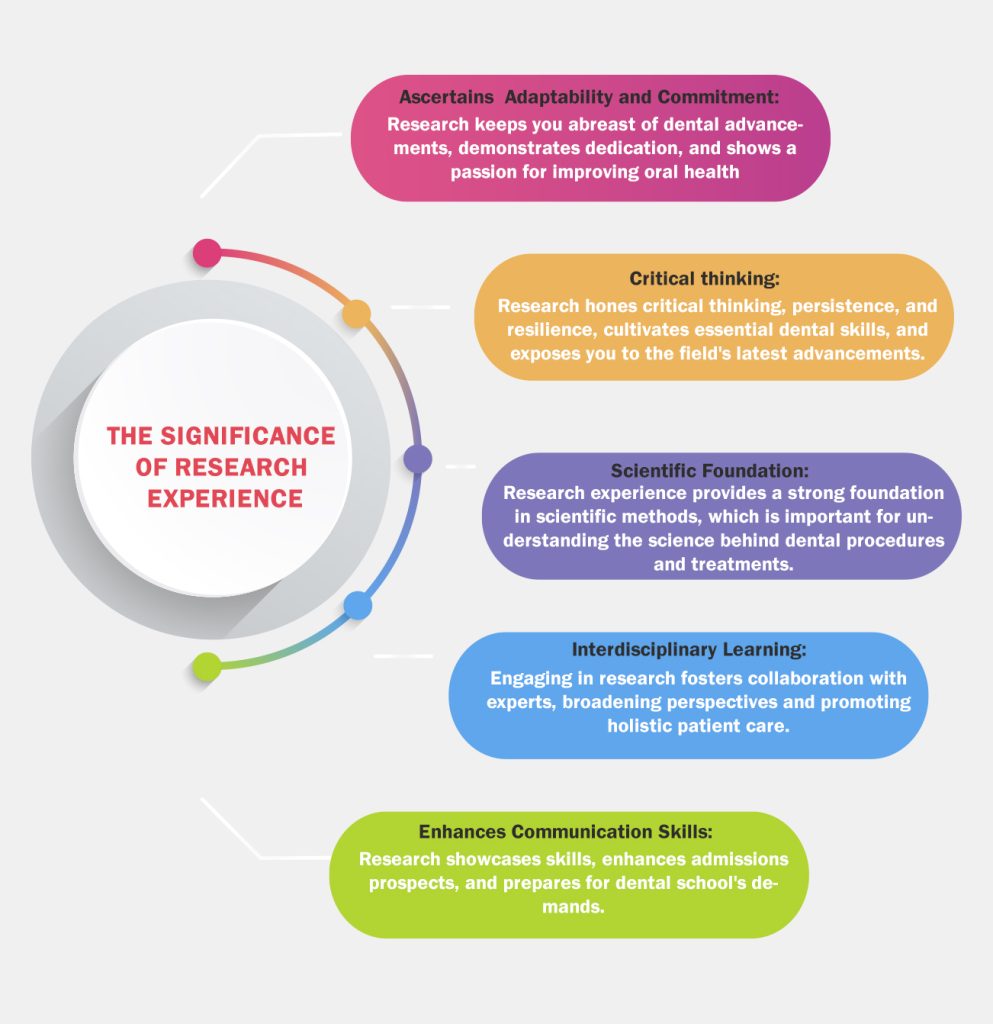
Benefits of engaging in research:
Research allows you to delve deep into a specific topic or field, gaining in-depth knowledge that standard coursework may not cover. It hones your skills as you analyze data, evaluate evidence, and make informed decisions based on your findings.
Research often requires innovative thinking to develop new solutions, methodologies, or approaches to tackle complex issues. Balancing research with other commitments teaches time management skills, a valuable asset in many aspects of life. Research experience can open doors to advanced degrees, academic positions, and research-focused careers in various industries.: Pursuing knowledge and discovery can be personally fulfilling and gratifying, giving you a sense of accomplishment.
Many research projects have the potential to contribute to the betterment of society by addressing pressing issues, improving technologies, or advancing scientific knowledge. It often involves investigating real-world problems, increasing your awareness of issues, and motivation to find solutions. It can be challenging and may involve setbacks. Overcoming obstacles builds resilience and perseverance.
Successful research can lead to publications in academic journals, conference presentations, and recognition within your field. Research can be a transformative experience fostering personal growth, self-confidence, and a sense of purpose. Whether you pursue research as a student, a professional, or an academic, the skills and benefits you gain from research can be invaluable in your personal and career development.
Should the research project be relevant to dentistry?
When applying to the Centralized Application for Advanced Placement for International Dentists (CAAPID) program, it is generally advisable to include healthcare research projects relevant to dentistry. Here are some reasons :
- Demonstrates Interest: Including dentistry or healthcare-related research in your application shows your interest in the field. Admissions committees are more likely to favor applicants who firmly commit to dentistry.
- Relevance to Dental Education: Research in dentistry or related fields can provide valuable insights and knowledge that directly apply to your dental education and future dental practice.
- Alignment with Program Goals: Dental schools and advanced placement programs like CAAPID often have specific educational objectives and goals. A research project in dentistry can align with these goals and show that you are a good fit for the program.
- Subject Matter Expertise: Research in dentistry can also highlight your expertise in the subject matter, making you a more competitive applicant.
- Clinical Application: Some research projects may have practical clinical applications that benefit your future dental practice. This can be particularly appealing to admissions committees.
UCLA Dental School – How to get in with low research experience
Is dental-related research background a criterion?
It’s important to note that while having dental-related research can be advantageous, it’s not the sole criterion for admission. Admissions committees also consider other factors such as academic performance, letters of recommendation, clinical experience, and personal statements. Therefore, providing a well-rounded application that showcases your overall qualifications and commitment to the dental profession is essential.
If you have research experience in a field closely related to dentistry, you can still highlight how the skills and knowledge gained from that research can be applied to your dental career. Ultimately, the key exemplifies your passion for dentistry and your proficiency to excel in the program.
Translational Research
Engaging in non-dental or translational research can also be valuable when applying to dental programs like CAAPID, as it can bring a unique perspective and skillset to your application.
Non-dental-oriented research can equip you with diverse research skills and experiences that apply to dentistry, such as data analysis, critical thinking, and research methodologies.
Translational Research, which bridges the gap between basic science and clinical application, can be particularly valuable. It demonstrates your ability to integrate knowledge from different fields, which can help address complex dental issues. It may encourage innovative thinking and problem-solving that can be applied to dental challenges. It can showcase your adaptability and creativity in approaching problems from different angles.
Regardless of the field, engaging in research illustrates your aptitude for scholarly work and commitment to advancing knowledge. This is a positive attribute in dental school applicants. Admissions committees value diversity in applicants’ experiences.
Non-dental Research can set you apart and make your application more interesting. Many skills developed in non-dental research, such as effective communication, project management, and teamwork, are highly transferable and can benefit you in dental education and practice. When including non-dental or translational research in your application, it’s essential to effectively communicate how these experiences have prepared you for a career in dentistry. Highlight the skills, knowledge, and perspectives you’ve gained and explain how they can contribute to your success in dental school and your future dental practice.
Ultimately, the key is demonstrating your passion for dentistry and your ability to excel in the program, regardless of whether your research is dental-oriented. Admissions committees are interested in dedicated, adaptable applicants who can make meaningful contributions to the field.
Engaging in Research Activities
Research can be a dynamic and evolving process, and each experience contributes to your growth as a researcher. Identifying and engaging in research activities as a preceptor, visitor, or matriculant in a program can be an enriching experience. Throughout your research journey, be open to learning from successes and challenges.
Remember that research is a cumulative process, and your involvement can vary based on your program and available opportunities. Be proactive, stay curious, and be prepared to adapt as you navigate your research path as a preceptor visitor in a research program.
Here, we walk you through a step-by-step guide on how to go about it:
- Identify Your Research Interests:
Begin by identifying your specific research interests within the broader field of your program. What topics or areas intrigue you the most? This will serve as a foundation for your research journey.
- Explore Faculty Expertise:
Research the faculty members at the institution you are visiting as a preceptor. Look for professors or researchers whose work aligns with your interests. Review their publications and ongoing research projects.
- Attend Seminars and Workshops:
Participate in seminars, workshops, and departmental meetings. These events often highlight ongoing research projects and provide opportunities to network with faculty and fellow students interested in research.
- Seek Mentorship
Approach faculty members or mentors whose research aligns with your interests. Express your enthusiasm for their work and inquire about potential research opportunities or projects you could get involved in.
- Review Research Opportunities:
Check for any ongoing research projects or collaborations at the research facility you are visiting. These projects may be looking for additional team members.
- Join Research Groups or Labs:
If there are research groups, labs, or centers related to your field of interest, consider joining them. These environments provide a structured setting for research and offer guidance and resources.
- Collaborate with Peers:
Connect with your fellow students, especially those who share your research interests. Collaborative research projects can be rewarding and provide different perspectives.
- Develop Research Proposals:
Develop a research proposal if you have a specific research idea. Discuss it with your potential mentor or advisor to refine your project’s objectives, methodology, and feasibility.
- Secure Funding:
Research often requires resources. Explore funding opportunities, such as grants, scholarships, or research assistantships, that can support your research endeavors.
- Participate Actively:
Immerse yourself in the project once you’ve identified a research opportunity. Attend regular meetings, conduct literature reviews, collect data, and collaborate with your mentor and team members.
- Present and Publish:
Share your research findings through presentations at conferences, seminars, or within your academic community. Consider submitting your work for publication in relevant journals.
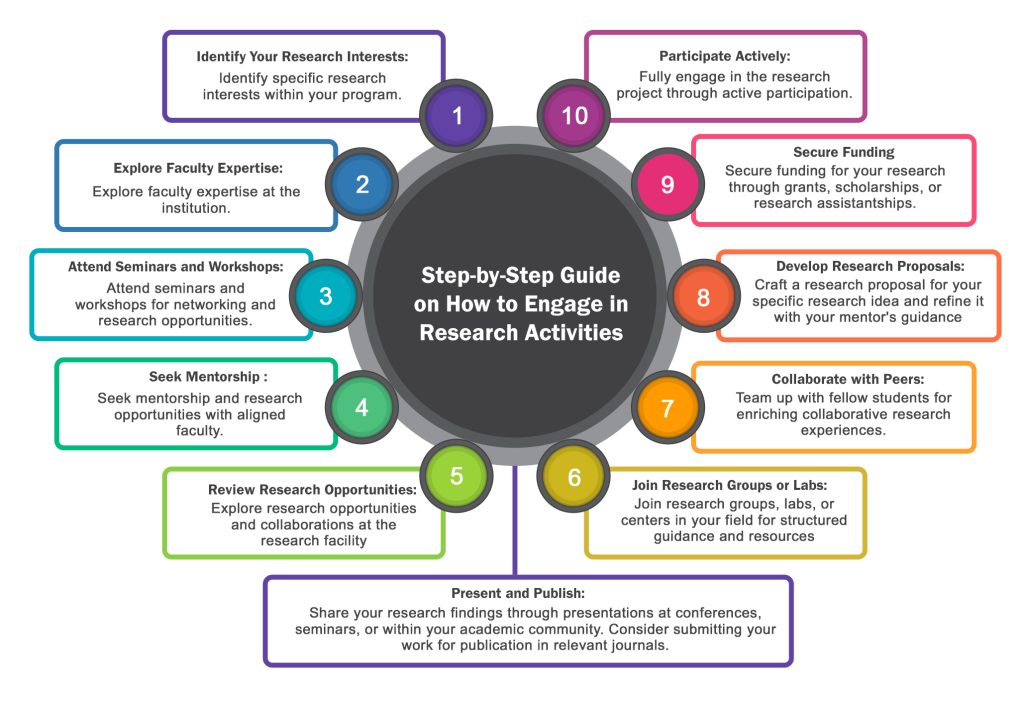
Renowned research labs in the U.S
Several renowned research labs and institutions are associated with dental schools worldwide. These labs are at the forefront of dental and oral health research, contributing to advancements in dentistry and related fields. While this list is not exhaustive, here are some famous research labs and institutions in dental schools:
- National Institute of Dental and Craniofacial Research (NIDCR) – NIH: Located in the United States, the NIDCR is a federal research institute dedicated to dental and craniofacial research. It collaborates with dental schools and research institutions across the country.
- Forsyth Institute: Based in Boston, Massachusetts, the Forsyth Institute is a leading dental research organization focusing on oral health and related scientific research.
- University of Michigan School of Dentistry: The University of Michigan is renowned for its dental research programs, including its Craniofacial Tissue Engineering Lab and other cutting-edge facilities.
- Harvard School of Dental Medicine: In Boston, Massachusetts, Harvard is home to various research labs and centers, including the Center for Craniofacial and Dental Genetics.
- University of California, Los Angeles (UCLA) School of Dentistry: UCLA has a well-established research program in various dental and oral health disciplines.
- University of North Carolina at Chapel Hill School of Dentistry: This institution has a history of dental research excellence and houses the UNC Craniofacial Center.
- University of Washington School of Dentistry: This institution in Seattle, Washington, has a strong research program, including the Center for Pediatric Dentistry and the Department of Oral Biology.
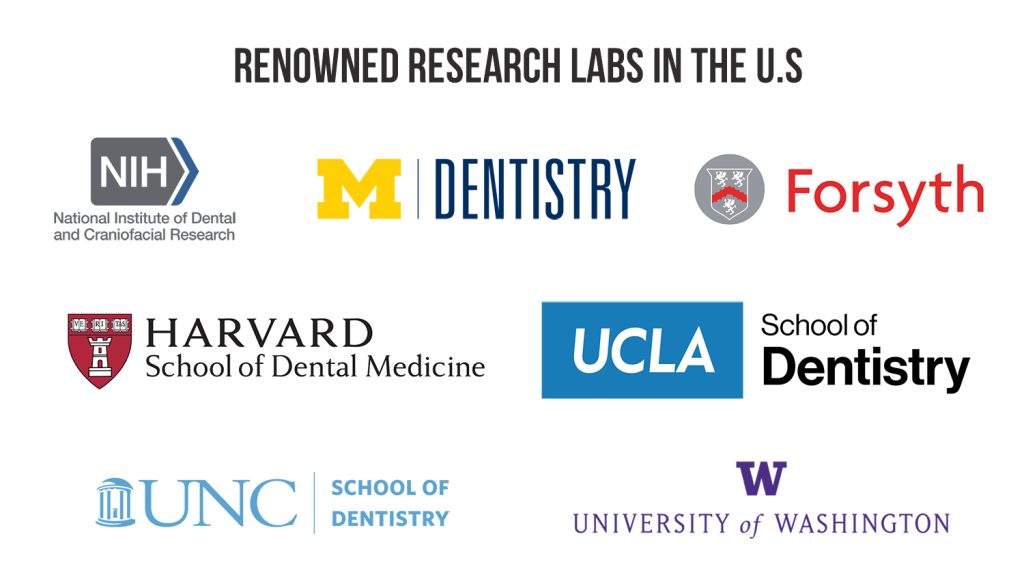
Penning an RA cover letter or request
Writing a cover letter or request for a research assistant position in a US research lab is an essential step. Here’s a step-by-step guide on how to compose an effective cover letter or request:
Start with a Professional Header:
- Include your name, address, phone number, and email address at the top of the document.
- Below this, include the date of writing.
- Begin with a clear and concise introduction.
- State the position you are applying for (e.g., Research Assistant) and where you found the job posting.
- Express your enthusiasm for the opportunity and briefly mention your background or interest in the field.
- Highlight Your Qualifications, skills, and experiences.
- Discuss your educational background, emphasizing any coursework or research experiences relevant to the lab’s focus.
- Mention any laboratory techniques, equipment, or software you are proficient in.
- Highlight any prior research involvement, internships, or projects that showcase your capacity to contribute to the laboratory’s objectives.
- Show Your Fit with the Lab
- Research the lab’s work and mention specific projects, publications, or areas of research that align with your interests and skills.
- Explain why you are drawn to this lab in particular and how you can contribute to their ongoing research efforts.
- Mention soft skills such as attention to detail, problem-solving abilities, teamwork, and adaptability, which are essential for success in a research environment.
- Explain how this position aligns with your long-term career goals and how it will contribute to your professional development.
- Conclude your letter by expressing your interest in discussing your qualifications further in an interview.
- Provide your availability for an interview or express your willingness to provide additional materials, such as references or transcripts.
- Include additional documents like a resume, academic transcripts, or reference letters if the application requires additional documents.
- Ensure that you follow the specific submission instructions the lab or employer provides.
- If submitting electronically, attach your cover letter as a PDF or follow the submission process outlined in the job posting.
Customize your cover letter for each application, tailoring it to the specific lab’s research focus and requirements. A well-crafted cover letter can significantly enhance your chances of securing a research assistant position in a US research lab.
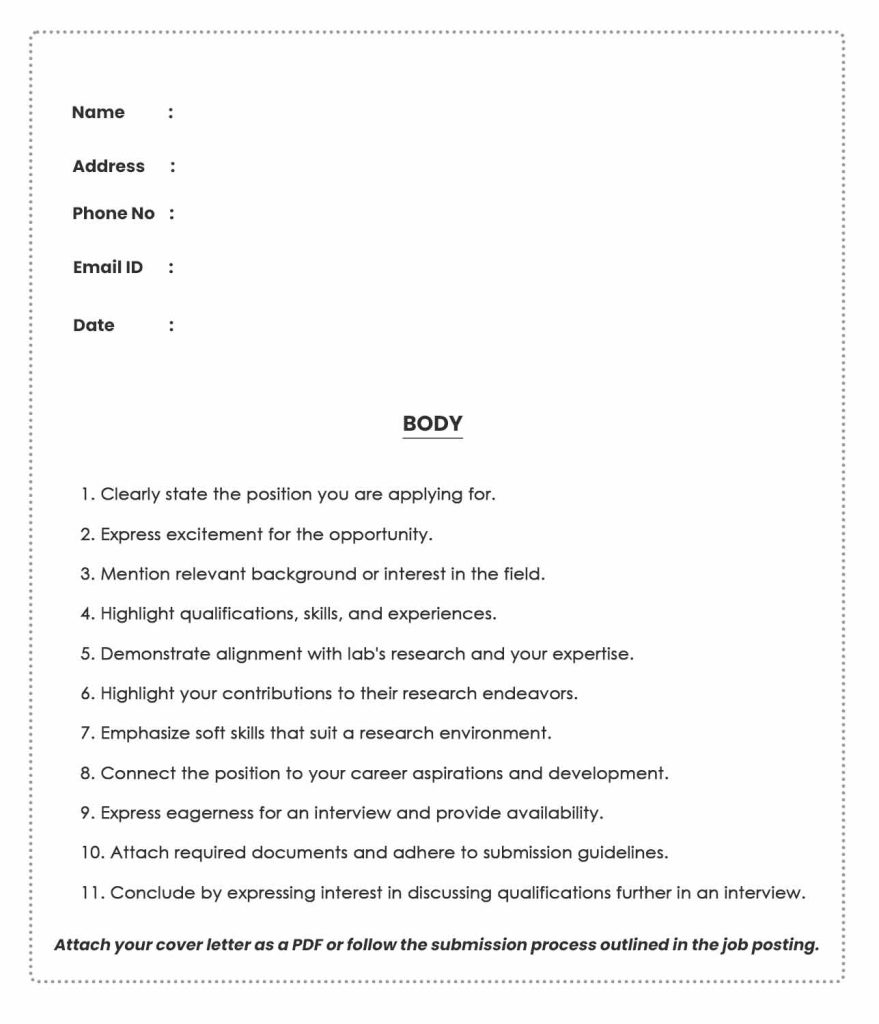
Reference of your projects in SOP/Application
If you have research experience relevant to your passion for dentistry or your motivation to pursue the field, you can highlight it in your statement. This allows you to explain how your research experience has shaped your goals and aspirations in dentistry. While research can significantly enhance your dental school application, it’s important to remember that it’s just one aspect of your overall candidacy. A well-rounded application with strong academic performance, clinical exposure, volunteer work, and effective communication skills is essential. Additionally, the significance of research may vary among dental schools, so it’s wise to research the specific admission criteria and preferences of the schools you’re applying to.
Can I mention a project, though it has yet to be published?
You can undoubtedly mention a research project in your application, even if it has not been published. Including research projects that are in progress is common in academic and professional applications, including dental school applications. Here’s how you can effectively include such research projects in your application:
Project Description
- In the relevant section of your CAAPID application, provide a clear and concise description of the research project.
- Explain the goals, objectives, and methodology of the research.
- Emphasize the project’s significance and how it relates to your academic and professional goals in dentistry.
Status of the Project: Indicate that the project is ongoing or has not been published. You can mention the research stage, such as data collection, analysis, or manuscript preparation.
Your Role:
- Describe your specific role and contributions to the research project.
- Mention any responsibilities you had, techniques you used, and challenges you encountered.
- Highlight how your involvement in the project has enhanced your research skills and understanding of the subject matter.
Expected Outcomes: Once completed, please discuss the research’s desired outcomes or potential contributions. This can help exhibit the relevance and significance of the project.
Mention Collaborators: If you worked with faculty members, researchers, or other collaborators on the project, acknowledge their involvement and briefly describe their roles. This can add credibility to your research experience.
Include Relevant Terminology: Use appropriate keywords and terminology related to your research project to showcase your understanding of the field and to make it easier for admissions committees to identify the relevance of your research.
Discuss Transferable Skills: Explain how the skills you’ve gained from this research project, such as critical thinking, data analysis, and problem-solving, will benefit you in your dental studies and future dental career.
Be Accurate: Ensure that all information you provide about the research project is accurate. Admissions committees appreciate transparency and honesty in applications.
Remember that while published research is valuable, admissions committees also recognize the importance of ongoing research and the potential impact it can have. Research experience, even if not published, can demonstrate your commitment to academic and scientific inquiry, which is highly regarded in dental school admissions.
Wrap Up
In summary, while research experience can enhance your dental school application and make you a more competitive candidate, it is optional for only some dental schools. The importance of research may vary from one institution to another, so it’s essential to carefully review each school’s admission criteria and tailor your application accordingly.
Researching the admission requirements and preferences of each dental school you plan to apply to is crucial. Some schools may explicitly state their preference for research experience, while others may not mention it as a requirement. Additionally, a well-rounded application that showcases your academic excellence, clinical exposure, and personal qualities is crucial for a successful dental school application.

